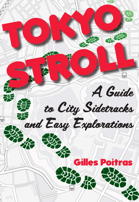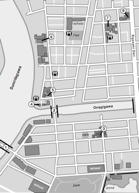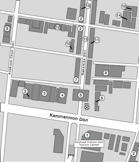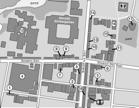











Tokyo Stroll Supplement: Marunouchi To Nagatachō

This page indexes, contains corrections and has additions to the Marunouchi To Nagatachō chapter of Tokyo Stroll. Updates will be announced on my blog.
For information on Tokyo Stroll and this web supplement see Tokyo Stroll Supplement home page
For users of the Organic Maps, Maps.Me and Google Maps apps the items below have bookmarks you can import into those apps to make navigation easier.
Instructions and links are on the Viewing Locations in Organic Maps, Maps.Me, Google Maps, or Google Earth page.
Some entries on this page may include a note that says "Description to be added soon ." These entries are for items I felt should be listed even if the description is not ready to assist those who wish to plan a trip. When possible I included a link to an official web page, I suggest also doing web searchs for more information.
DN Tower 21 (DN タワー 21): Tokyo Stroll, Marunouchi To Nagatachō Chapter, page 214
NEAREST TRAIN/SUBWAY STATION: Hibiya Station (Tokyo Metro Hibiya Line, Tokyo Metro Chiyoda Line)
Gojira [Godzilla] Statue (ゴジラ像): Tokyo Stroll, Marunouchi To Nagatachō Chapter, page 215
NEAREST TRAIN/SUBWAY STATION: Hibiya Station (Tokyo Metro Hibiya Line, Tokyo Metro Chiyoda Line), Yūrakuchō Station (JR Yamanote Line, JR Keihin–Tōhoku Line, Tokyo Metro Yūrakuchō Line)
Hibiya Matsumotorō (日比谷松本楼)
The Hibiya Matsumotorō was founded 1903, the same year as Hibiya Park opened
From the beginning the restaurant served yōshoku, which are dishes influenced by Western foods. The beef curry that made Hibiya Matsumotorō famous is one of those dishes still served today. Such food was considered unique and trendy at the time of its founding. The restaurant thusly became very fashionable with the modern set, intellectuals, and progressive artists.
The Pan no Kai, or Pan Society, an important group of writers, actors, and artists who wished to transform the arts of Japan, held its first meeting at the restaurant. Among the noted customers who frequented the restaurant were Takamura Kōtarō and Natsume Sōseki. Another visitor was Sun Yat-sen, who discussed plans there for the Chinese revolution with his friend Umeya Shōkichi.
Please excuse a digression about this interesting relationship. In 1882 when he was 14 Umeya went to Shanghai where he was robbed and turned to working at the docks to survive. His experience of the mistreatment of Chinese workers by the British led him to support Chinese independence from foreign powers. After that trip he returned to Japan to shortly again travel overseas where he would live for many years. In 1895 Umeya met Sun Yat-sen in Hong Kong, both were in their late 20s at this time, and their friendship began. Upon returning to Japan in 1905 with a fortune he had made overseas, as well as a reputation for supporting revolutionary activities, Umeya founded the movie company M. Pathe. He would use income from that and other projects project to help fund anti-Manchu revolutionaries. When he was in exile in 1913 Sun Yat-sen was introduced to Soong Ching-Lin by Umeya and his wife Toku and in time the two exiles were wed in the Umeya's home. Umeya would in 1933 get in trouble with the Japanese nationalists and be branded a traitor for his support of peace in China. He would, in 1934, be asked to be an unofficial emissary to China by the Japanese foreign minister but died before he could make the trip. At the funeral Umeya's casket was draped in both the Japanese and Chinese flags. By the way Umeya's grand-daughter would later marry Kosaka Tetsuro who owned the restaurant. The current owner is Kosaka Ayano Umeya's great-grandson.
During the allied Occupation of Japan the restaurant, which was also the home of the owners, was converted into living quarters for U.S. officers until 1951. During that time the owners slept in a storeroom in the building and had to carry special identification to leave and return as that portion of the park was under direct US control.
In 1971, Hibiya Matsumotorō was destroyed by arson during the violent protests around provisions in the Okinawa Reversion Treaty that returned the islands to Japanese control. A new restaurant was built and opened in September 1973. Every year, to commemorate the reopening, on September 25 a 10-yen curry charity sale is held as a fundraising event for charity where every donation over 10 yen gets you a plate of curry.
The current restaurant includes private rooms, banquet halls, on the third floor a French restaurant, and there is an outdoor terrace dining area. Seating is Western style and the restaurant is non-smoking.
NEAREST TRAIN/SUBWAY STATION: Hibiya Station (Tokyo Metro Hibiya Line, Tokyo Metro Chiyoda Line)
WEB:
http://www.matsumotoro.co.jp
Hibiya Park / Hibiya Kōen (日比谷公園): Tokyo Stroll, Marunouchi To Nagatachō Chapter, page 220
NEAREST TRAIN/SUBWAY STATION: Hibiya Station (Tokyo Metro Hibiya Line, Tokyo Metro Chiyoda Line)
WEB: https://www.tokyo-park.or.jp/park/hibiya/
Hie Shrine / Hie Jinja (日枝神社): Tokyo Stroll, Marunouchi To Nagatachō Chapter, page 224
NEAREST TRAIN/SUBWAY STATION: Kokkai-gijidōmae Station (Tokyo Metro Chiyoda Line, Tokyo Metro Marunouchi Line)
WEB: https://www.hiejinja.net
Japan Sake and Shōchū Information Center / Nihon no Sake Jōhōkan (日本の酒情報館): Tokyo Stroll, Marunouchi To Nagatachō Chapter, page 222
NEAREST TRAIN/SUBWAY STATIONS: Uchisaiwaicho Station (Toei Mita Line), Toranomon Station (Tokyo Metro Ginza Line)
WEB:
https://japansake.or.jp/sake/en/
KITTE (キッテ): Tokyo Stroll, Marunouchi To Nagatachō Chapter, page 211
NEAREST TRAIN/SUBWAY STATION: Tokyo Station (Tokyo Metro Marunouchi Line, JR Tōkaidō Main Line, JR Ueno–Tokyo Line, JR Keihin–Tōhoku Line, JR Yamanote Line, JR Chūō Main Line, JR Chūō Line (Rapid), JR Sōbu Main Line, JR Sōbu Line (Rapid), JR Limited Express Narita, JR Yokosuka Line,JR Keiyō Line, and many JR Shinkansens lines: Tōhoku Shinkansen, Yamagata Shinkansen, Akita Shinkansen, Jōetsu Shinkansen, Hokuriku Shinkansen, Hokkaido Shinkansen, Tōkaidō Shinkansen)
WEB:
KITTE:
https://marunouchi.jp-kitte.jp
Intermediatheque:
http://www.intermediatheque.jp/en
Maruzen Marunouchi (丸善 丸の内): Tokyo Stroll, Marunouchi To Nagatachō Chapter, page 211
NEAREST TRAIN/SUBWAY STATION: Ōtemachi Station (Tokyo Metro Tozai Line, Tokyo Metro Marunouchi Line, Tokyo Metro Hanzōmon Line, Tokyo Metro Chiyoda Line, Toei Mita Line), Tokyo Station (Tokyo Metro Marunouchi Line, JR Tōkaidō Main Line, JR Ueno–Tokyo Line, JR Keihin–Tōhoku Line, JR Yamanote Line, JR Chūō Main Line, JR Chūō Line (Rapid), JR Sōbu Main Line, JR Sōbu Line (Rapid), JR Limited Express Narita, JR Yokosuka Line,JR Keiyō Line, and many JR Shinkansens lines: Tōhoku Shinkansen, Yamagata Shinkansen, Akita Shinkansen, Jōetsu Shinkansen, Hokuriku Shinkansen, Hokkaido Shinkansen, Tōkaidō Shinkansen)
Masakado no Kubizuka (将門の首塚): Tokyo Stroll, Marunouchi To Nagatachō Chapter, page 208
NEAREST TRAIN/SUBWAY STATION: Ōtemachi Station (Tokyo Metro Tozai Line, Tokyo Metro Marunouchi Line, Tokyo Metro Hanzōmon Line, Tokyo Metro Chiyoda Line, Toei Mita Line)
Meiji Mutual Life Insurance Building / Meiji Seimei Kan (明治生命館): Tokyo Stroll, Marunouchi To Nagatachō Chapter, page 212
NEAREST TRAIN/SUBWAY STATION: Nijūbashimae Station (Tokyo Metro Chiyoda Line)
Ministry of Justice Museum / Hōmu Shiryō Tenjishitsu (法務史料展示室): Tokyo Stroll, Marunouchi To Nagatachō Chapter, page 221
NEAREST TRAIN/SUBWAY STATION: Sakuradamon Station (Tokyo Metro Yūrakuchō Line)
WEB:
https://www.moj.go.jp/ENGLISH/mojm-01.html
Mitsubishi Ichigōkan Museum / Mitsubishi Ichigōkan Bijutsukan (三菱一号館美術館): Tokyo Stroll, Marunouchi To Nagatachō Chapter, page 212
NEAREST TRAIN/SUBWAY STATIONS: Yūrakuchō Station (JR Yamanote Line, JR Keihin–Tōhoku Line, Tokyo Metro Yūrakuchō Line), Tokyo Station (Tokyo Metro Marunouchi Line, JR Tōkaidō Main Line, JR Ueno–Tokyo Line, JR Keihin–Tōhoku Line, JR Yamanote Line, JR Chūō Main Line, JR Chūō Line (Rapid), JR Sōbu Main Line, JR Sōbu Line (Rapid), JR Limited Express Narita, JR Yokosuka Line,JR Keiyō Line, and many JR Shinkansens lines: Tōhoku Shinkansen, Yamagata Shinkansen, Akita Shinkansen, Jōetsu Shinkansen, Hokuriku Shinkansen, Hokkaido Shinkansen, Tōkaidō Shinkansen)
WEB:
https://mimt.jp/?lang=en
National Diet Building / Kokkaigijidō (国会議事堂): Tokyo Stroll, Marunouchi To Nagatachō Chapter, page 222
NEAREST TRAIN/SUBWAY STATION: Kokkai-gijidōmae Station (Tokyo Metro Chiyoda Line, Tokyo Metro Marunouchi Line)
WEB:
House of Representatives:
http://www.shugiin.go.jp/internet/index.nsf/html/index_e.htm
House of Councilors:
http://www.sangiin.go.jp/eng/index.htm
National Diet Library / Kokuritsu Kokkai Toshokan (国立国会図書館): Tokyo Stroll, Marunouchi To Nagatachō Chapter, page 224
NEAREST TRAIN/SUBWAY STATION: Nagatachō Station (Tokyo Metro Hanzōmon Line, Tokyo Metro Namboku Line, Yūrakuchō Line), Sakuradamon Station (Tokyo Metro Yūrakuchō Line)
WEB:
https://www.ndl.go.jp/en/
Old Ministry of Justice Building / Hōmu Shōkyū Honkan (法務省旧本館): Tokyo Stroll, Marunouchi To Nagatachō Chapter, page 221
NEAREST TRAIN/SUBWAY STATION: Sakuradamon Station (Tokyo Metro Yūrakuchō Line)
Quatre Reves (キャトルレーヴ)
Takarazuke Theater gift shop
Description to be added soon
NEAREST TRAIN STATION: Hibiya Station (Tokyo Metro Hibiya Line, Tokyo Metro Chiyoda Line), Yūrakuchō Station (JR Yamanote Line, JR Keihin–Tōhoku Line, Tokyo Metro Yūrakuchō Line)
WEB: https://www.tca-pictures.net/quatre_reves/
Seikadō Bunko Art Museum / Seikadō Bunko Bijutsukan (静嘉堂文庫美術館)
Description to be added soon
NEAREST TRAIN/SUBWAY STATION: Nijubashimae Station (Chiyoda Line), HibiyaStation (Chiyoda Line, Hibiya Line, Mita Line)
WEB: https://www.seikado.or.jp
Takarazukaan Hibiyaten (宝塚アン 日比谷店)
Description to be added soon
NEAREST TRAIN STATION: Hibiya Station (Tokyo Metro Hibiya Line, Tokyo Metro Chiyoda Line), Yūrakuchō Station (JR Yamanote Line, JR Keihin–Tōhoku Line, Tokyo Metro Yūrakuchō Line)
WEB: https://www.takarazuka-an.co.jp/c/aboutus/aboutus_01/aboutus_013
Tokyo International Forum (東京国際フォーラム): Tokyo Stroll, Marunouchi To Nagatachō Chapter, page 214
NEAREST TRAIN/SUBWAY STATION: Yūrakuchō Station (JR Yamanote Line, JR Keihin–Tōhoku Line, Tokyo Metro Yūrakuchō Line)
WEB:
http://www.t-i-forum.co.jp
https://vinoly.com/works/tokyo-international-forum/
https://www.antique-market.jp/english/
Tokyo Metropolitan Police Department / Keishichō (警視庁): Tokyo Stroll, Marunouchi To Nagatachō Chapter, page 221
NEAREST TRAIN/SUBWAY STATION: Sakuradamon Station (Tokyo Metro Yūrakuchō Line)
Tokyo Station / Tokyo Eki (東京駅): Tokyo Stroll, Marunouchi To Nagatachō Chapter, page 211
WEB:
https://www.tokyostationcity.com/en/
Tokyo Station Gallery (東京ステーションギャラリー)
[At the north end of Tokyo Station in Marunouchi To Nagatachō Detail 1 map]
A small museum operated by JR East since 1988 with closure between 2006 and 2012 when the 3rd floor of the station was restored to its pre-war glory. The gallery is located within the dome at the Marunouchi North Exit of Tokyo Station on the second and third floors, there is an elevator and stairs to the gallery. The facility has a dual function, to display the material used in the original construction of the station, and to display art. Exhibits are changed regularly throughout the year, and the gallery will close between exhibits.
Lockers are located on the first floor between the elevator and restrooms, large bags can also be checked for when you are in the gallery. Some strollers and wheelchairs are available which may be borrowed by visitors. Free Wi-Fi is in the gallery area, a store is in the paid area on the 2nd floor.
Information as of June 6, 2022
Admission: Adults: 1,300 yen
High-school and University students: 1,100 yen
Junior high-school students and younger: Free
Hours: 10 am - 6 pm (Friday until 8 pm)
CLOSED: Monday unless it is a holiday in which case they will be closed on Tuesday.
NEAREST TRAIN/SUBWAY STATION: Tokyo Station (Tokyo Metro Marunouchi Line, JR Tōkaidō Main Line, JR Ueno–Tokyo Line, JR Keihin–Tōhoku Line, JR Yamanote Line, JR Chūō Main Line, JR Chūō Line (Rapid), JR Sōbu Main Line, JR Sōbu Line (Rapid), JR Limited Express Narita, JR Yokosuka Line,JR Keiyō Line, and many JR Shinkansens lines: Tōhoku Shinkansen, Yamagata Shinkansen, Akita Shinkansen, Jōetsu Shinkansen, Hokuriku Shinkansen, Hokkaido Shinkansen, Tōkaidō Shinkansen)
WEB: https://www.ejrcf.or.jp/gallery/index.asp
Tokyo Takarazuka Theater / Tōkyō Takarazuka Gekijō (東京宝塚劇場): Tokyo Stroll, Marunouchi To Nagatachō Chapter, page 215
NEAREST TRAIN/SUBWAY STATION: Hibiya Station (Tokyo Metro Hibiya Line, Tokyo Metro Chiyoda Line), Yūrakuchō Station (JR Yamanote Line, JR Keihin–Tōhoku Line, Tokyo Metro Yūrakuchō Line)
Yūraku Inari Shrine / Yūraku Inari Jinja (有楽稲荷神社): Tokyo Stroll, Marunouchi To Nagatachō Chapter, page 214
NEAREST TRAIN/SUBWAY STATION: Hibiya Station (Tokyo Metro Hibiya Line, Tokyo Metro Chiyoda Line), Yūrakuchō Station (JR Yamanote Line, JR Keihin–Tōhoku Line, Tokyo Metro Yūrakuchō Line)
Yūrakuchō (有楽町): Tokyo Stroll, Marunouchi To Nagatachō Chapter, page 215
NEAREST TRAIN/SUBWAY STATION: Hibiya Station (Tokyo Metro Hibiya Line, Tokyo Metro Chiyoda Line), Yūrakuchō Station (JR Yamanote Line, JR Keihin–Tōhoku Line, Tokyo Metro Yūrakuchō Line)
Back to the Tokyo Stroll Supplement home page - Privacy Notice - Back to Gilles' home page
Created June 4, 2022 | Content last updated September 16, 2025